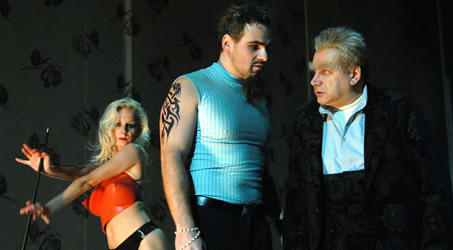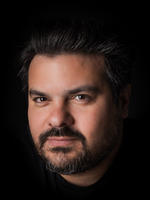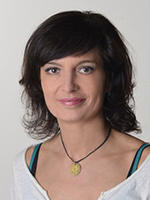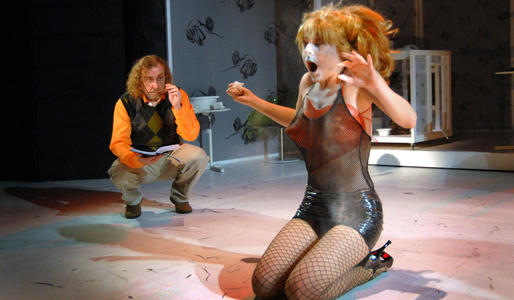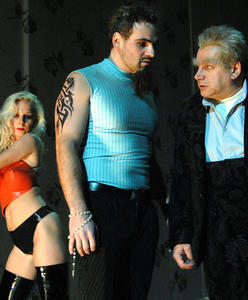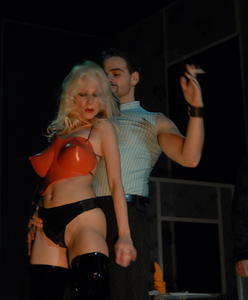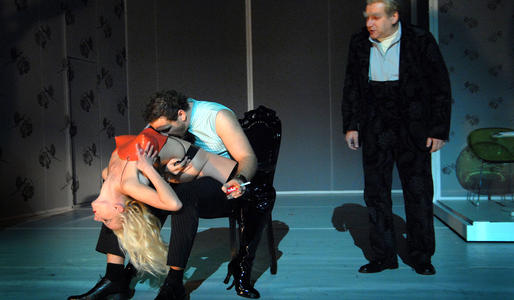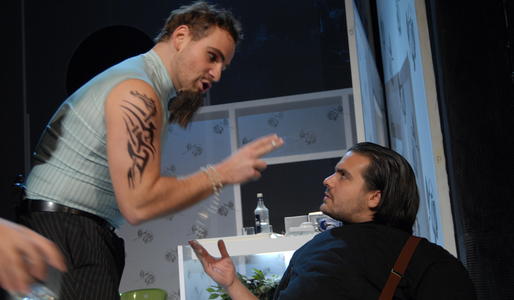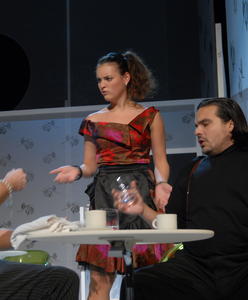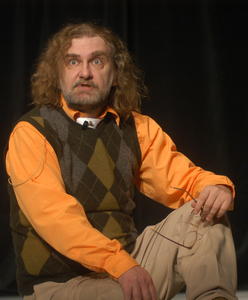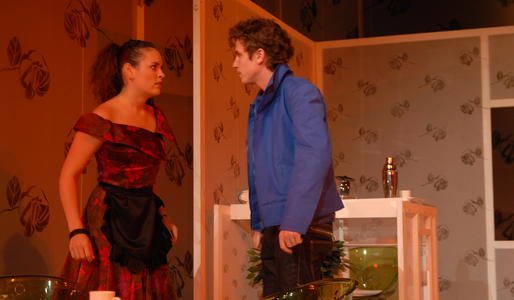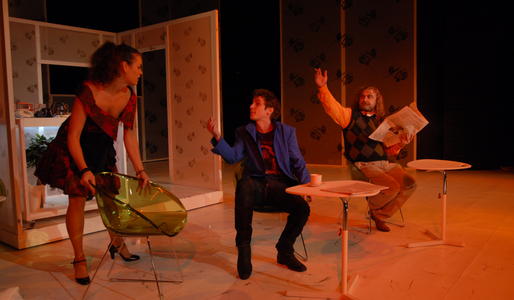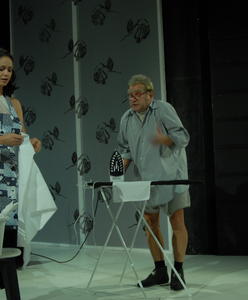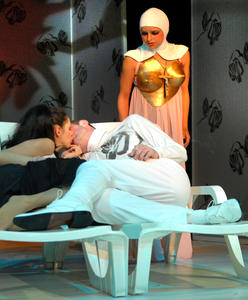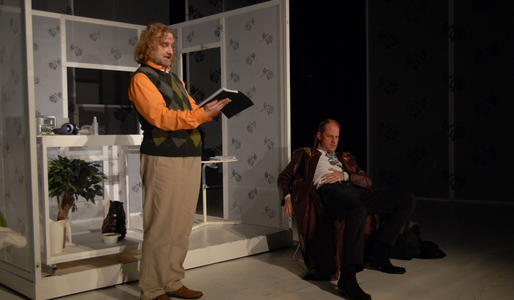Once again, the gangsters have Lidická in their power
Vít Závodský 15. January 2008 zdroj Kam
This new work from the workshop of the new boss of Mahen's drama theatre is, as is traditional, accompanied by the thorough production values of dramaturgists Jan Šotkovský and Petr Minařík. Originally, it was announced as an updated transcript of the romantic drama in verse, The King Takes His Amusement, by Victor Hugo. However, apart from the names of the three main heroes, only the basic topic of the non-reality of the isolation of Mafia society with harsh criminal manners from the peace of a family hearth remains. The team, which shares an aesthetic philosophy (among which there is the designer Markéta Oslzlá, the author of the "light" scenery with transparent surfaces and mobile equipment, the author of the daring costume designs Martina Zwyrteková, and the "godfather" of the performance, Daniel Landa who contributes three well-chosen songs), transferred the action into an attractive setting amongst contemporary criminal low-life in Marseilles in South France. They developed it into 31 short acts, with several interlinking plot-lines and on top of that, made use of the retrospective level, which gave the original text, as well as the not-very-long continuous performance, a quite ingeniously composed structure.
The bloody practices of the Mafia members, who are dressed in black (Martin Havelka, Ján Jackuliak, Alan Novotný) around the King (Igor Ondříček), who has fallen in love with the at-first-unsuspecting daughter of his helper Triboulet (Jan Mazák), Blanche (Ivana Vaňková), clearly and unashamedly take their inspiration from American films (Godfather I and II, Scarface, Pulp Fiction etc.) and are viewed, in an ironic way, by their involuntary participant who is, at the same time, a narrator commenting via monologue – eccentric loner Cyril Abidi (the sober Viktor Skála in alternation with the open and charismatic Martin Dohnal, for whom this role was tailor-made).
In contrast with V. Hugo and the gangster film element, another, religious - mystical layer was a quite surprising addition, embodied by the appearances of the young White Friar St. Theresa of Lisieux (Mária Lalková), who brings spiritual dimensions to the piece (her real confessions are cited) and who becomes the forgiving catalyst of the King's repentance and his miraculous moral rebirth. In the intentionally marginal genre depiction and post-modern fanciful structures varied expressive means are used quite clearly - the simultaneity of images, Latin passages, visual symbolism (snowing, roses), sentimental, comics-like or intentionally kitsch elements are all used, as well as hyperbole, light and animation effects, various "Parnass" fetishes (a white rabbit), insinuations and connotations which are probably enjoyed mainly by the authors themselves. Nevertheless, The Diary of the King offers a remarkable experience even for an ordinary spectator.
The diary of a Mafia boss
Iveta Macková 15. January 2008 zdroj Kult
The plot of the performance follows two basic, continuously interlinked lines - one of the main characters, Cyril Abidi, is a lonely eccentric who is a kind of narrator for all the stories and sometimes even their participant. The second line is formed by the individually-acted scenes of Mafia stories from the King's diary which he entrusts to Abidi to store for his son.
The jewel of the performance is undoubtedly the acting performances of the protagonists, starting with Viktor Skála (Abidi, alternating with Martin Dohnal), followed by Igor Ondříček (the King), Ivana Vaňková (Blanche) and Jan Mazák (Triboulet), and also many others. The play is performed in simple costumes by Martina Zwyrteková which symbolize the characters, on a stage by Markéta Oslzlá, enclosed by walls of purposeful, witty and versatile scenery.
The godfather of the performance is the singer and composer Daniel Landa whose songs are heard in the performance, at full volume. The performance lasts one and a half hours and is performed without a break.
Brno, the theatre, the authors and the closet
Luboš Mareček 7. December 2007 zdroj Dnes
Four new releases by Brno's theatres show the local theatre scene in a different light. Analysis of this incongruous quartet suggests that interesting authorial experiments are no longer the domain of stages which have made a living from being "experimental" - and until recently, have been hiding behind it. In the case of HaDivadlo, Arnošt Goldflam's original text has been mangled by collective directing, and there are some question marks over the new performance at Provázek. The authorial pieces The Diary of the King and Roxana are however, despite certain reservations, certainly experiences.
The Diary of the King. It may seem that almost incongruous inspirations have met in the The Diary of the King, which is performed at Brno City Theatre as the newest work of the artistic association Střežený Parnas. The text by Zdenek Plachý and Jiří Šimáček was inspired by the play The King Takes His Amusement, American gangster films and the writings of St. Theresa of Lisieux. A triangle composed from a great romantic figure, celluloid coloured by the dealings of the Mafia, and the poems of a saint - it all sounds a bit much. The result is, however, a successful tragicomedy in which crime shakes hands with religious kitsch in a spectacular way.
The authors situated the play The Diary of the King in the underworld of Marseilles and the environment of organized crime after the year 1989. A tragic line running through the play is the fate of the characters of Triboulet and his only daughter Blanche, whom he is bringing up alone. She falls in love with the King, from whose influence she should have been protected, as well as from that of the Mafia environment. It finishes with strong love and disaster: both the father and the daughter die. The comic element is represented by lonely misanthrope Cyril Abidi after the King’s diary falls into his hands. He becomes the narrator of the story, which he constantly comments upon, ironically. And as a spiritual treat, everything is accompanied by the saintly White Friar, St Theresa of Lisieux, who brings about the King’s conversion.
This unusual cocktail mixes and looks with irony at incongruous genres and topics. Some people might get a headache from this; someone's soul may feel pain. Střežený Parnas (perhaps even with irony) mainly want you to make a decision. Someone may convert to the view that everything is one great exaggeration, while others will take this story of a converted criminal seriously. And, as is common in post-modernism, both views are correct. One of the strong points of the evening is, apart from the script which constantly arouses the spectator's participation (meaning both in terms of real interest and with emotions), Zdenek Plachý's skilful direction. The visually very attractive performance has pace; moving scenes are constructed in an imaginative way. The silent entries of the saint balance on a knife-edge between technicolored religious dross and an acceptable spiritual miracle. The effective tension in this performance arises from the reorganization of borders. The Diary of the King touches on emotional and general ethical thresholds. However, schoolboy directorial mistakes stand out and distract one from total engrossment in the topic. Abidi reads situations from the diary which the King couldn't have recorded. However, Plachý overcomes this by creating a miracle, which is an impressive finale. He bombards the stage with images, music, projections. Not only the protagonist will experience catharsis…. Not every liberal-minded (i.e. independent) theatre would dare to stage such a text. And so all the more is this a victory for a repertoire theatre which is not only visited for its urbanely stylish and well-proven repertoire. Occasional artistic infusions of this kind are both a blessing and an absolution for their comfortably lethargic audience.
The Diary of the King
David Kroča 18. November 2007 zdroj ČRO 3 - Vltava
A tragicomedy by Zdenek Plachý and Jiří Šimáček, The Diary of the King offers a promising plot. The ex-boss of a Mafia gang, known as the King, returns to Marseille to settle old debts. While handing over a bag full of money to his old accomplices, he gets shot and has to seek help. Quite by coincidence, he meets a bitter intellectual, Abidi, with whom he leaves his diary, which was created as a message for the King’s lost son. The audience watches the action unfold on two scenic planes: the current situation, which depicts the Mafia’s search for the injured King, and a retrospective one, in which the unbelievable story of his complicated life unfolds.
Director Zdenek Plachý doesn’t just stage his own text as a simplistic gangster play but rather uses the attractive plot as a frame for expressing deeper meanings. This comedy, which is simply arranged from its very beginning, grows into a fine-spun morality tale in which the life stories of the characters illustrate post-modern chaos and the decline of interpersonal relations. While the corrupt Mafia members shoot at one another mindlessly all the time, their boss, the King, surprisingly becomes a ‘good guy’ at the end of the play. This happens as a result of the intervention of his charismatic wife, as well as of mystical apparitions of St. Theresa of Lisieux, a dreamy character who enters the storyline repeatedly.
The performance has a strange, magical atmosphere. It is mainly because of the unifying song by the well-known singer and composer, Daniel Landa, which accompanies the key moments of the story. The heavy, monumental music is accompanied by computer animations by David Možný, projected onto the white stage with a motif created by Markéta Oslzlá. The main motif of the artistic decorations is a rose, the symbol of St. Theresa who inspires the main protagonist to convert.
Igor Ondříček, in the leading role, develops the character of the Mafia boss using only modest means, as a cold-minded pragmatist who is both respected and feared for his self-confidence. The most rewarding role of the performance, however, is not the King, but rather the bitter anthropologist Abidi. Viktor Skála endowed him with comic rituals that stress his pedantry, but also with the ability to comment pertinently on the narrated events and hence unveil their hidden meanings. The King’s woman of destiny, Blanche, is played by Ivana Vaňková, with emphasis being placed on her disarming loyalty and frankness.
The Diary of the King on the stage of Brno City Theatre is, in fact, inspired more by American gangster films than by the actual drama by Victor Hugo. Even though Jiří Šimáček and Zdenek Plachý’s dramatic script might seem to be rather artificial, it creates a decent dramatic show, in connection with the powerful music, well thought out acting and artistic effects, and a spiritual message which is easy to see.
The Diary of the King and a shotgun (and a certain Ravel)
Jan Šmikmátor 18. November 2007 zdroj KAM v Brně
This new production by Jiří Šimáček and Zdenek Plachý had its first nights on 2nd and 3rd November and showed the potential to become another successful play in an already better-than-average season which has begun at Moša’s theatre.
A basically trivial plot about Marseille gangsters, their past, disputes, treasons and acts of revenge is made interesting by the narrative style as well as by the narrator himself. It is the musicologist, Cyril Abidi, excellently played by Martin Dohnal (alternating with Viktor Skála) who was assigned the role of strange commentator and observant complainer.
Abidi has the non-enviable gift of being in the wrong place at the wrong time. He becomes part of the plot immediately in the second act, and after that, leaves the stage only sporadically. He follows the film-like plot, alternating between the past in retrospective and the present, and entertains the audience with his strictly scientific interpretations. Alongside this, he dreams of writing a monograph about Maurice Ravel, but he is constantly interrupted by gangsters (or the neighbour with a noisy vacuum-cleaner, or a postman).
The main hero of the performance is the Mafia boss, the King (persuasive Igor Ondříček). It is he who leaves his diary in Abidi’s flat, from which the narrator reads out, first in a critical way and later with greater and greater interest. The story talks about his lover, Blanche (Ivana Vaňková), his Mafia rival Le Banner (Martin Havelka) and his henchmen (the great Ján Jackuliak, and Alan Novotný, sporting a nice belly with the aid of a pillow). Mysterious appearances of St. Theresa of Lisieux (Mária Lalková) add another dimension to the performance.
The minimalist, sober stage with its almost comic-book simplicity allows the acting performances, as well as the music, to stand out. In a play which mentions Ravel the famous piece Bolero must be heard, and Plachý found a very clever way to do this. Due to the reconstruction, he sends Abidi onto the forestage where he recites the main motif of the piece, at the beginning without music, and grading in a similar way to the original.
The role of godfather to the play, which is one not very often filled, shows that Střežený Parnass and provocation go hand in hand. This role belongs to Daniel Landa, three of whose songs are heard in the play (including Tajemství - A Secret, a song which is also often played on the radio). However, The Diary of the King is a quality show which won’t disappear from theatre-goers’ minds as soon as they leave the theatre. And that’s good.
Times are changing; even crime isn’t what it used to be
Jiří P. Kříž 1. December -1 zdroj Právo
‘Diary of the King’ records the unbelievable transformation of a Marseilles gangster, and also of Daniel Landa.
Zdenek Plachý and Jiří Šimáček’s Střežený Parnass have begun to fight with provincial Czech conventions via their next project at Brno City Theatre. It is the (this time) indisputably excellent ‘Diary of the King’, which is very freely inspired by the play ‘The King Takes his Amusement’ by Victor Hugo.
The mission of Střežený Parnass seems to be to provoke, to look for new ways of addressing archetypes using omnipresent banalities, to laugh at the decay of quasi-literary genres. The director Plachý chose, for a change, a combination of gangster film style and religious mysticism.
Inspired by the “urban western” sub-genre, he has made use of the laws of Mafia dime novels for the construction of a text about the miraculous transformation of one of ‘the family’. Technically, it is close to the grotesque exaggerations of Quentin Tarantino (‘Reservoir Dogs’, ‘Pulp Fiction’) and to the urge to disclose in Sergio Leone’s last opus (‘Once upon a Time in the West’). The Parnass effort has two poles: the first of them is the apparition of Saint Theresa of Lisieux, who brings the King to penitence and redemption. Mária Lalková is such a beautiful Theresa that even a bitter reviewer is willing to turn into a lamb under her wings. The other pole is an obscure pundit and eccentric, Cyril Abidi. The King’s diary falls into his hands and he interprets it to the spectators – first, with ironic comments about spelling mistakes and poor style, later with fascination at the transformation of the gangster.
A role tailor-made for the body and soul of Martin Dohnal (in alternation with Viktor Skála).
Hugo also gets a word in here via the motif of a Mafioso – stooge (Jan Mazák), who strives with all his might to protect his fair daughter Blanche (Ivana Vaňková) from passionate crimes. But, imagine, he cannot protect her; she loves the King (Igor Ondříček) turning him inside out...
Havelka the Mafioso, and others
The family of Mafiosi is represented by orthodox villains played by Martin Havelka, Ján Jackuliak, Alan Novotný and Vojtěch Blahuta. Their world is made prettier by Evelína Jirková, Lenka Janíková etc.
Let’s say a few words about Martina Zwyrtek’s costumes– they emphasise plastic musculature (Havelka) and provocative, materially artificial, pointy breasts, including those of St. Theresa.
And about the choice of excellent songs by Daniel Landa - these will provoke all those who haven’t taken notice of his transformation…

